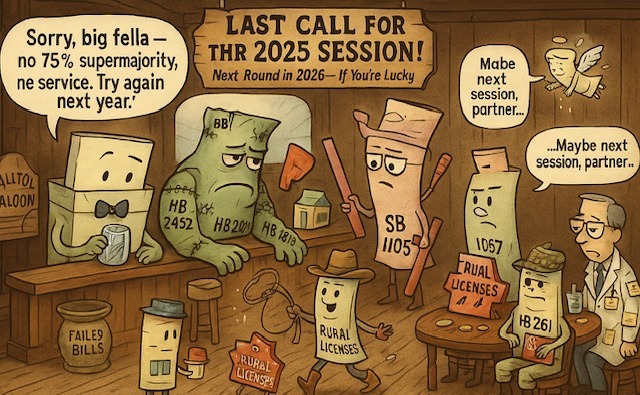Arizona lawmakers continued to reshape the state’s cannabis landscape this session, advancing some proposals while watching others collapse under political and industry pressures. From new advertising restrictions to tighter buffers around preschools, the 2025 legislative session was marked by fierce debates over how far to expand—or rein in—marijuana and hemp regulation. Even as key measures like House Bill 2179 and Senate Bill 1105 became law, a host of other bills, from rural licensing to veteran fee relief, fizzled out before reaching the governor’s desk.
The flurry of cannabis legislation highlights a Capitol divided over balancing consumer access, child safety, public health, and the economic stakes of Arizona’s multibillion-dollar marijuana industry. Striker amendments turned routine bills into last-minute cannabis battles, while proposals to redirect marijuana tax dollars toward policing ran headlong into the state’s voter-protected Proposition 207. As the dust settles, lawmakers and lobbyists are already eyeing the 2026 session to revive failed efforts—and possibly push new ones even further.
At A Glance
TOTAL CANNABIS & HEMP BILL- 14
SIGNED- 2
STRIKERS- 2
Failed To Be Scheduled To 1st Round Of Standing Committees
(never progressed pass chamber of origin)
HB2245- Appropriation; Medical Marijuana; Veterans; Fees
Failed to be heard in House Federalism, Military Affairs & Elections Committee
Chance of 2026 return- Medium
HB2261- Medical Marijuana; Fee; Exemption; Veterans
Failed to be heard House Health & Human Services Committee
Chance of 2026 return- Medium
HB2904 – Landlords; Tenant’s Marijuana Use
Failed to be heard House Commerce Committee
Chance of 2026 return- Medium
HB2941 – Marijuana Cultivation; Water Usage
Failed to be heard House Natural Resources, Energy & Water Committee
Chance of 2026 return- Medium
HCR2027- Marijuana; Unincorporated Areas; Reservations; Prohibition
Failed to be heard House Health & Human Services Committee
Chance of 2026 return- HIGH
SB1702 – Hemp-derived products; regulation
Failed to be heard Senate Regulatory Affairs and Government Efficiency Committee
Chance of 2026 return- HIGH
SB1716 – Medical marijuana; invalidity; exception
HELD Senate Health and Human Services Committee
Chance of 2026 return- Medium
Failed To Cross Over to Opposite Chamber
SB1713- Marijuana; dual licensees; rural communities
Failed Senate Third Read (18-9-3)
Failed to be recalled Motion To Reconsider
Chance of 2026 return- Medium
Failed To Be Heard 2nd Round Standing Committees
(never heard in opposite chamber of origin)
SB1556: Adult hemp beverages; policies; procedures
Failed to be heard in House Appropriations by deadline
Removed from House Appropriations Agenda
Chance of 2026 return- Medium
Failed 3rd Read After Crossover
SB1230- Marijuana; Clinical Research Trial
Failed House Third Read (13-39-8)
Failed to be recalled Motion To Reconsider
Chance of 2026 return- Medium
SB1057 Marijuana; dual licensees; rural communities
(was) Commerce; trade; passport identification
Failed House Third Read (21-34-5)
Chance of 2026 return- Medium
SB1299 Smart and safe Arizona fund (was)
law enforcement personnel; grant program
Failed to pass ¾ threshold House Third Read (32-24-4)
Chance of 2026 return- HIGH
Signed To Become Law
SB1105- Medical Marijuana Dispensaries; Location
HB2179-Marijuana; Advertising; Restrictions
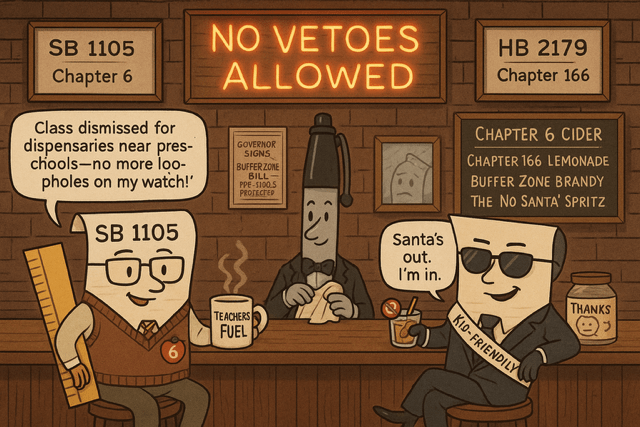
House Bill 2179: Marijuana Advertising Crackdown Signed Into Law
House Bill 2179, restricting advertising of marijuana and related products, was signed into law in 2025. This new law follows on the heels of House Bill 2451 from 2024, which was sponsored by then-House Health and Human Services Committee Chair Steve Montenegro (R-LD 29). That earlier attempt advanced through the House but stalled before reaching the Committee of the Whole.
This year, the bill returned with fresh momentum. Lawmakers and pediatricians rallied around protecting children, pointing to imagery like Santa Claus smoking a blunt. Representative Selina Bliss (R-LD 1), current chair of the House Health and Human Services Committee, carried HB 2179. Unlike in previous years, the Arizona Dispensaries Association threw its weight behind the measure.
Originally, HB 2179 sought to clamp down on smoke shops, hemp companies, and licensed marijuana businesses by blocking them from advertising paraphernalia, CBD, Delta-8, and cannabis products without holding an expensive marijuana license. After crossing over to the Senate, lawmakers amended the bill during the Committee of the Whole. The final version dropped restrictions on hemp and paraphernalia ads. It now allows smoke shops and hemp sellers to advertise their wares, so long as they steer clear of Santa or other kid-friendly mascots.
Read the new law (Chapter 166)
Senate Bill 1105: New Law Tightens Buffer Around Preschools
Senate Bill 1105, titled “Medical Marijuana Dispensaries; Location,” was signed into law after lawmakers raced to respond to an October 2024 Arizona Court of Appeals decision. In 3 SL Family, LLC v. State of Arizona, the court ruled that under the Arizona Medical Marijuana Act (AMMA), the term “public or private school” does not include preschools. That interpretation upheld a 2016 license issued to a dispensary next door to two preschools in Ahwatukee, despite fierce community backlash.
Three months after the appellate decision, Senator Shawnna Bolick (R-LD 2) sponsored SB 1105 to close the loophole. The new law explicitly adds childcare facilities and preschools to the AMMA’s 500-foot buffer zone, blocking future dispensaries from opening too close to early childhood centers.
Read the new law (Chapter 6)
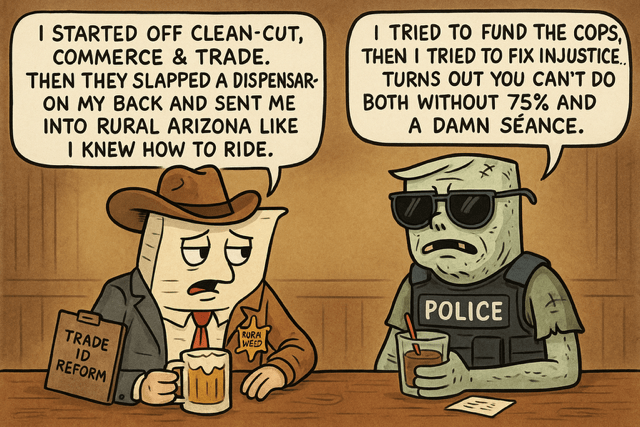
Cannabis Strikers: SB 1057 and SB 1229 Flip Their Scripts
A striker amendment (short for “strike everything amendment”) is a powerful tactic that lets lawmakers wipe out a bill’s original text and swap in something entirely different, often on a totally unrelated topic. Examples of this year’s cannabis strikers include Senate Bill 1057, which was rewritten from “Commerce; Trade; Passport Identification” into “Marijuana; Dual Licensees; Rural Communities,” giving the failed Senate Bill 1713 another shot in the House. Another example is Senate Bill 1229, which started as a law enforcement personnel grant program but was overhauled into a bill about the Smart and Safe Arizona Fund.
Rural Cannabis Licensing Bills Collapse in Arizona Legislature
Senate Bill 1713, titled Marijuana; Dual Licensees; Rural Communities, was introduced by Senator David Gowan (R-LD 19). The bill failed on third reading in the Senate and never advanced to the House. Undeterred, lawmakers gave the proposal a second chance by inserting it as a striker amendment into Senate Bill 1057. Representative Michael Weinger (R-LD 13) sponsored the 13-page striker, which directed the Arizona Department of Health Services to establish rules for up to 16 licenses. Each would allow one retail dispensary and one off-site facility for cultivation or manufacturing, but only in underserved rural communities that chose to opt in.
The proposal sparked sharp debate during a March hearing in the House Appropriations Committee. Pele Fisher, lobbying for the Arizona Dispensaries Association, warned the bill would expand both medical and recreational licenses far beyond Proposition 207’s original aim to regulate, not endlessly grow, the industry. Supporters, including Jon Udell of the Arizona Rural Opportunity Alliance, pushed back, arguing that rural patients still face limited access and monopoly-level pricing.
When S.B. 1057 finally reached the House floor, the vote turned chaotic. Party lines blurred, lawmakers split in all directions, and the bill failed on third read by a vote of 21–34, with five members present but not voting. No one filed a motion to reconsider. For now, this rural cannabis licensing push is dead.
Striker Bill Targeting Cannabis Tax Dollars Fails to Meet Supermajority Threshold, Leaves Prop 207 Intact
The Arizona Legislature’s failed attempt to redirect marijuana tax dollars toward law enforcement fell short of the voter protections embedded in Proposition 207, despite clearing a simple majority vote.
The proposal began as a striker amendment to SB 1299, morphing from last year’s HB 2452, which carried nearly the same theme. Originally, SB 1299 focused on a grant program for law enforcement personnel. Under the striker, it was recast as the Smart and Safe Arizona Fund, drawing revenue from the —a pot of money fueled by the state’s 16% excise tax on recreational marijuana sales.
The measure carved out $2.5 million “off the top” of the fund to bolster Department of Public Safety (DPS) efforts to crack down on unlicensed cannabis operations.
Representative Matt Gress (R‑LD4), backed by legal cannabis industry groups, contended the bill was necessary to curb a thriving illicit market. He pointed to a roughly 20% dip in regulated sales, arguing that increased enforcement would protect consumers and help restore tax revenue flows.
But Representative Nancy Gutiérrez (D‑LD18) spoke out against shifting marijuana dollars to policing, citing letters from Tucson residents and nonprofits like Second Chance Tucson, which assists people reentering society after incarceration.
“Proposition 207 was intended, in part, to support community-based efforts that address the root causes of drug dependence—reducing the need for reactive law enforcement measures,” Gutiérrez said. She also highlighted trauma-informed care programs serving communities from Phoenix to the Havasupai Tribe in Northern Arizona, warning they stood to lose vital funding.
As the bill moved through its first Committee of the Whole, lawmakers added an amendment allowing DPS to tap up to 10% of the new fund for enforcing the Smart and Safe Arizona Act, plus another 5% to cover administrative costs.
Then came a surprise twist. Lawmakers immediately reconvened for “Add COW 1,” tacking on language from HB 2813, a separate bill sponsored by Representative Powell that would create a compensation process for wrongfully convicted individuals. This new Erroneous Convictions Fund would also draw money from the Justice Reinvestment Fund—funded by the same cannabis tax revenues under Prop 207.
A follow-up amendment, “Add COW 2,” corrected technical errors. But by then, the bill’s identity had shifted dramatically. The wrongful convictions measure dominated debate and was widely seen as a strategic move to win over hesitant House Democrats.
The final vote fell along party lines, passing 32-24-4—barely over 51%. That might have been enough under ordinary circumstances, but under the Voter Protection Act, changes to laws enacted by ballot initiatives like Prop 207 require a 75% supermajority. Without that threshold, the bill is effectively dead on arrival.
In the end, the Legislature approved a measure on paper that cannot take effect, leaving Prop 207’s funding promises. Leaving the measure lifeless.
SB 1230: Clinical Marijuana Research Bill Fails in Arizona House
A simple, seemingly noncontroversial measure to restart clinical marijuana research in Arizona met an unexpected roadblock this session. Senate Bill 1230, sponsored by Senator Kevin Payne (R–27), cleared the Senate but ultimately failed in the House, where leadership chose not to bring it back for a final vote despite initial support for reconsideration.
SB 1230 sought to correct a problem in a 2021 statute, House Bill 2298, which allowed grants for marijuana research but used the word “may” instead of “shall.” That subtle wording difference meant the Arizona Department of Health Services never awarded any grants from the Arizona Medical Marijuana Fund. With the fund shrinking—due in part to fewer medical marijuana patients since voters approved recreational cannabis under the Smart and Safe Arizona Act (Proposition 207)—SB 1230 aimed to make awarding research grants mandatory.
The bill passed the Senate without significant opposition. However, when it reached the House, lawmakers voted it down 13–39–8 on third reading. No clear explanation emerged during committee hearings or floor debate, leaving its defeat somewhat of a mystery. Although the House did pass a motion to reconsider the measure, leadership never brought SB 1230 back to the floor before the end of the session.
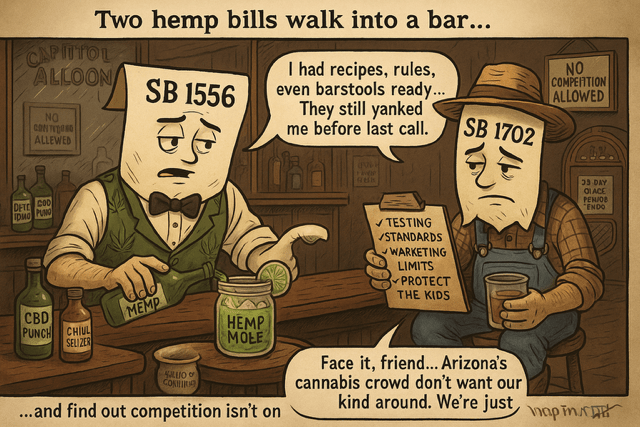
Two Hemp Bills Fail to Advance Competition in Arizona’s Cannabis Industry
Two hemp-related bills aimed at regulating hemp-derived cannabinoids and expanding the market for hemp products failed to pass during the 2025 Arizona legislative session.Both bills’ failures mark a continued struggle to introduce greater competition and clearer regulation in Arizona’s expanding cannabis industry.
SB 1556: Effort to Regulate Adult Hemp Beverages Dies in Arizona House
Senate Bill 1556, titled Adult Hemp Beverages; Policies, sought to establish Arizona’s first regulatory framework for hemp-infused beverages, modeling oversight on existing liquor laws. Sponsored by Senator T.J. Shope (R–8), the 128-page proposal aimed to create a new legal category to accommodate rising consumer demand and retailer interest in hemp-derived adult drinks.
The legislation cleared the Arizona Senate but faltered in the House, where it was removed from the House Appropriations Committee agenda before receiving a hearing. The bill appeared on track for committee consideration until opponents held a press conference on the State Capitol lawn the same morning, raising concerns about its potential impact.
Maricopa County Attorney Rachel Mitchell (R) publicly opposed SB 1556, stating, “The Maricopa County Attorney’s Office stands ready to enforce the law as it exists today to hold violators accountable, but we are honoring the 30-day grace period set by Attorney General Kris Mayes.” Earlier, Attorney General Mayes (D) had directed retailers to stop selling hemp-infused beverages by April 24, pending clearer state regulations.
Supporters of SB 1556 argued the measure would create a fair, structured environment for licensed retailers to offer hemp-infused alternatives to alcohol, broadening options for consumers and supporting those who choose not to drink alcohol.
With interest in hemp products continuing to rise, advocates are optimistic that a similar proposal will return in the next legislative session with stronger backing.
SB 1702: Renewed Push to Regulate Hemp-Derived Products Fails to Advance
For the third consecutive year, Arizona lawmakers declined to advance legislation aimed at tightening regulations on hemp-derived products. Senate Bill 1702, sponsored by Senator David Gowan (R–19), sought to establish clearer oversight of cannabinoids found in popular consumer items ranging from gummies to beverages. The bill failed to receive a hearing in the Senate Regulatory Affairs and Government Efficiency Committee, effectively halting its progress early in the 2025 session.
SB 1702 built on earlier proposals—SB 1186, HB 2679, and HB 2406—by strengthening testing requirements, imposing stricter marketing restrictions, and prioritizing child safety within Arizona’s existing regulatory framework. It also would have expanded the Arizona Department of Agriculture’s authority to oversee hemp-derived cannabinoid products to better protect consumers.
Supporters argue the legislation is necessary to close gaps in current law, ensure product safety, and provide consistent rules for the rapidly growing market. Despite its failure this year, advocates anticipate Senator Gowan will introduce a similar measure during the 2026 legislative session.
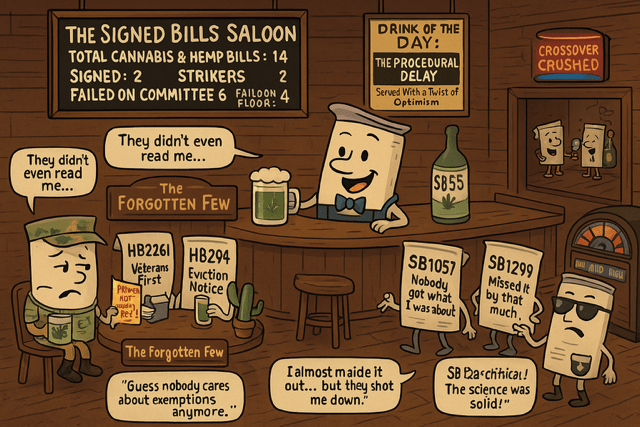
Two Bills Aimed at Easing Medical Marijuana Costs for Veterans Fail to Gain Traction in Arizona Legislature
Two separate bills intended to help veterans afford medical marijuana cards stalled early this session, failing to advance even to their initial standing committees. Despite bipartisan interest in addressing the cost burden on veterans, neither proposal made it past the earliest stages of the legislative process.
HB 2245: A Democratic Proposal for All Veterans
House Bill 2245, sponsored by Democrats, sought to establish a $10 million fund in the 2025-2026 fiscal year to cover the cost of medical marijuana cards for veterans. The money would have remained available indefinitely, creating a lasting safety net to ensure that veterans of all backgrounds could access medical cannabis regardless of their financial circumstances.
HB 2261: A Republican Approach to Waiving Fees
Meanwhile, HB 2261, backed by Republican lawmakers, proposed waiving the application fee for medical marijuana cards specifically for honorably discharged veterans. Unlike HB 2245, this bill did not allocate any state funding, opting instead to provide financial relief by exempting these veterans from paying the fee outright.
Never Making It Out of the Gate
In the end, neither bill advanced to a hearing in its chamber of origin’s standing committees. Both measures effectively died on the vine, leaving the question of how best to reduce costs for veterans seeking medical marijuana cards unresolved for yet another session.
Notable Cannabis Bills That Could Return Next Session
Although these proposals failed to advance this year—many never even making it to a hearing in their chamber of origin’s standing committees—they highlight key policy debates that are likely to come back when lawmakers reconvene.
Tenant Protections for Cannabis Use: HB 2904
HB 2904, modeled after last year’s HB 2301, sought to bar landlords from evicting tenants solely for using cannabis, whether medical or recreational. The bill aimed to secure housing protections for renters who lawfully consume marijuana.
Cannabis and Water Conservation: HB 2941
HB 2941 tackled the intersection of cannabis cultivation and Arizona’s pressing water concerns. It proposed requiring marijuana growers to submit comprehensive water conservation plans detailing their efforts to reduce usage, proposed watering techniques, reuse systems, total cultivation area, and monthly water data. The measure also capped individual cultivation canopy sizes at 30,000 square feet, imposing additional fees for those exceeding the limit, with funds directed toward statewide water conservation. Despite its alignment with Arizona’s broader push to protect water resources, the bill was never heard in the House Natural Resources, Energy & Water Committee.
Restricting Marijuana in Unincorporated Areas and on Reservations: HCR 2027
Dubbed a “zombie bill” for returning year after year, HCR 2027 sought to limit nonprofit dispensary registrations, establish certification rules for third-party labs, and regulate marijuana operations on Indian reservations. It would only have needed a simple majority to advance to the ballot for voters to decide. However, it once again failed to receive a hearing, marking its third consecutive stalled attempt.
Fix for Rural Medical Marijuana Access: SB 1716
SB 1716 revisited an issue dating back to the 2020 lawsuit over Arizona’s failure to ensure every county had at least one medical marijuana dispensary. The bill aimed to protect dispensary licenses in underserved rural areas that were delayed by litigation—ensuring they wouldn’t lose certification because they missed opening deadlines for reasons beyond their control. Despite its implications for rural patient access, SB 1716 was never heard by the Senate Health and Human Services Committee.


